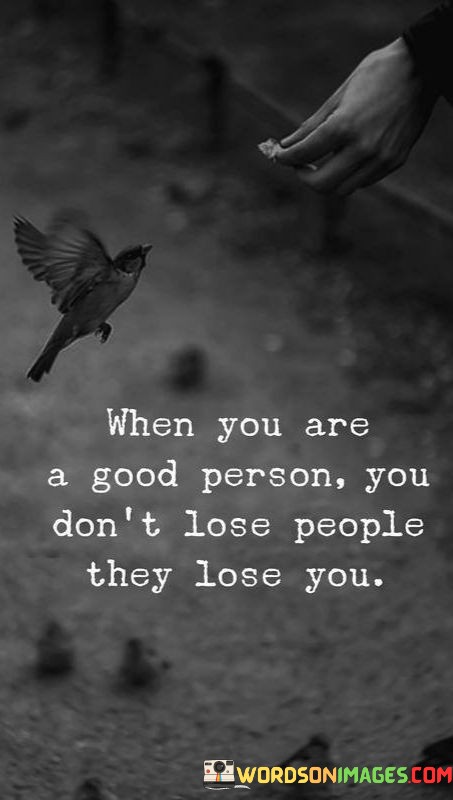The quote, "When you are a good person, you don't lose people; they lose you," embodies a powerful message about integrity, self-worth, and the dynamics of relationships. It suggests that individuals who genuinely embody goodness, kindness, and authenticity maintain their value and dignity in all interactions. When someone walks away from a person of such character, it is not a reflection of the good person's inadequacy, but rather an indication of the other person's inability to recognize and appreciate their worth. The essence of the quote lies in the idea that being a good person involves upholding moral values, treating others with respect, and acting in alignment with one's principles. Goodness is not merely a superficial facade but a reflection of one's core values and genuine empathy towards others. When a good person forms connections with others, they do so with sincerity and without ulterior motives. They are authentic in their actions and genuinely care for the well-being of those around them. This authenticity and empathy often create deep and meaningful bonds in relationships. However, not everyone may recognize or reciprocate the goodness of a person. Some individuals may fail to appreciate the positive impact the good person has in their lives or may take their presence for granted. In such cases, if the good person chooses to distance themselves or set boundaries in response to unappreciative or toxic behavior, it is not a sign of their failure or weakness. Instead, it signifies their self-respect and willingness to protect their emotional well-being. The quote also emphasizes the importance of self-worth and not compromising one's values for the sake of keeping others in their lives. A good person understands their inherent value and refuses to tolerate mistreatment or disrespect. By walking away from unhealthy relationships, they affirm their worth and prioritize their emotional and mental health. Moreover, the quote sheds light on the idea that relationships are a two-way street. While it is important to be kind, caring, and understanding, it is equally essential for others to reciprocate and value those qualities. If someone chooses to walk away from a relationship with a good person, it is their loss because they are letting go of someone who offered genuine kindness, support, and positivity. In conclusion, the quote celebrates the essence of being a good person by highlighting the significance of authenticity, self-worth, and setting healthy boundaries in relationships. Good people hold their value, and when others choose to leave their lives, it is not a reflection of their character but rather a reflection of the other person's choices and actions. The quote encourages individuals to recognize and appreciate their own goodness, to stand firm in their values, and to prioritize their well-being in all relationships. By doing so, they embody the strength and resilience that come with being true to oneself and affirming one's worth in the face of life's complexities.


